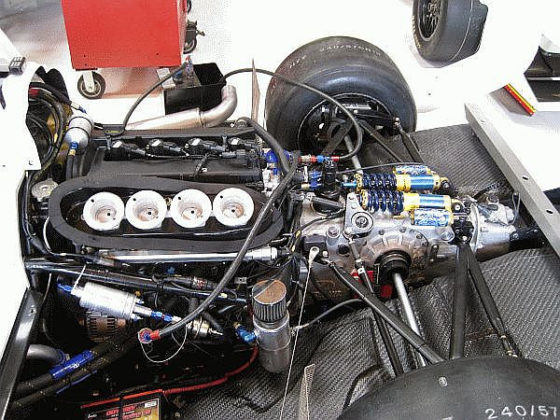,
 |
||
| First, the axle needed to be narrowed the same 6 inches as the front. Narrowing an axle is one of those things that everyone thinks is easy, but few actually know how to do. This is apparently how it's done… |
 |
||
| To ensure proper alignment when welding the axle back together, Tim machined alignment blocks to take the place of the bearings, and aligned them with a solid-steel bar. |
 |
||
| The bar holds all the bearings in perfect alignment while the axle is welded back together, ensuring happy axles, bearings and diff. |
 |
||
|
I always wondered where splines come from. They come, if you aren't mass producing, from cutting one tooth at a time. And, 28 cuts later, we have splines. |
 |
||
| Freshly narrowed, its time to make it fit. The RX-7 used a 4-link arrangement, with short upper arms and long lower arms. With a little bending, and lengthening, the lower arms were convinced to bolt into the front mounts of the old leaf spring. |
 |
||
| Mounts for the upper arms were fabricated and welded into the front of the wheel well. |
 |
The donor car came with mysterious blue springs in the rear, and cut stock springs in the front. Fearful of snap oversteer with their ludicrously-short wheelbase, the Hamster crew didn't want an overly-stiff rear suspension. Front ride height was adjusted by trimming even more off the front springs, further increasing the front spring rate. In the rear, though, they decided to keep the springs full length to keep the suspension as soft and understeery as possible. | |
 |
To this end, very tall rear spring towers were fabricated leaving room for the big spring, and spacers were made (from plywood!) to adjust the ride height as needed.
|
|
 |
||
| On paper, the RX-7's Watt's link is the best way to locate an axle laterally, since it lets the axle move straight up and down and should have even jacking forces when turning left or right. In reality, the RX-7's Watts setup left a lot to be desired. It was mounted off to one side, with uneven arms mounted at strange angles. Virtually all RX-7 racecars “downgrade” to a simple Panhard bar. |
 |
||
| Cutting up the Watts link for hardware made the Panhard bar fab relatively simple. |
 |
||
| With relatively little suspension motion compared to a softly-spring street car, the disadvantages of a Panhard bar become largely irrelevant on the track. |
That's all the awesomeness you're gonna get today. In Part 2, on Monday, we'll explore how the powertrain went in. The engine installation makes this suspension fab look simple.


 The axle shafts themselves each need to be trimmed 3 inches, meaning the splines that engage the diff got cut off. Good thing Tim knows how to make splines.
The axle shafts themselves each need to be trimmed 3 inches, meaning the splines that engage the diff got cut off. Good thing Tim knows how to make splines.



